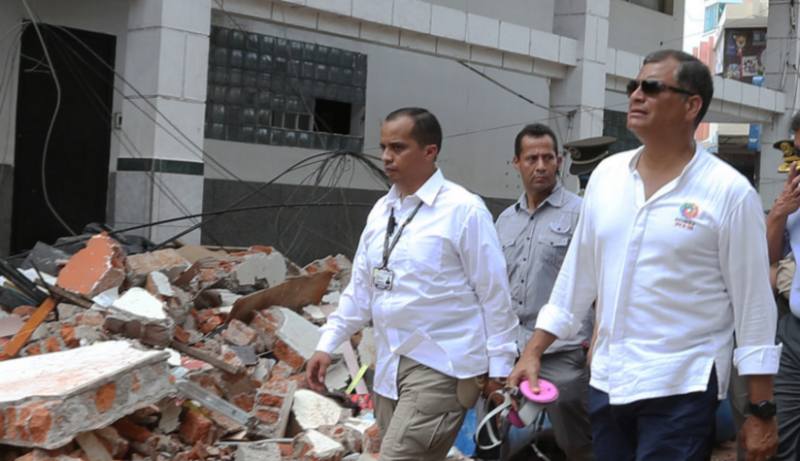Latin America Advisor
A Daily Publication of The Dialogue
What Does Ecuador Need in Order to Rebuild?

Ecuadorean President Rafael Correa on April 20 announced tax increases, including a one-time levy on millionaires, in order to pay for rebuilding after the country’s devastating 7.8-magnitude earthquake on April 16. It is estimated that it will cost the country $3 billion to repair the damages to infrastructure caused by the natural disaster. Is Correa’s plan to increase taxes going to be enough to rebuild Ecuador? What else can the government do to help repair its infrastructure and assist those affected by the earthquake? How much of a role will international aid and multilateral organizations play in administering disaster relief and recovery efforts?
Abelardo Pachano, president of Finanview in Ecuador, former CEO of Produbanco and former Ecuadorean central bank president: "Without a doubt, the earthquake and its consequences have worsened the country’s current recession. This natural disaster has hit Ecuador, which currently has low monetary reserves, a large fiscal deficit and a weakened balance of payments. The country has high unemployment and low consumption. Damage from the earthquake surpasses the government’s management capacity. This involves the whole community. It is crucial to know the magnitude of damage to establish plans of action and sources for financing. Immediate action has been taken at the disaster zones by civil society volunteers. The government is doing its part, but there needs to be a space for alliances, agreements and support. It is essential to have a well-defined and planned strategy. The recession demands that we do not overtax contributors. There is a need for creativity in formulating solutions, such as international emergency credits, renegotiating the debt with China and, if there is a remaining deficit, looking at how there could be domestic contributions. The country needs to find incentives to recover all economic activities that are now damaged. We shouldn’t forget that governments normally cover 30 percent of the costs of damages. Civil society takes on the rest, and that is a large and relevant burden. The government should remain calm and look for a transparent mechanism of managing resources to ensure the future."
Marc Becker, professor of history at Truman State University: "Natural disasters are difficult for any society, and most illustrative is how people respond to them. The January 2010 earthquake in Haiti was deadly, precisely because of a lack of a functioning government, which should be a lesson for those who advocate neoliberal policies. Government regulations are necessary to ensure that structures are sound, and governments offer the first line of response in times of crisis. Fortunately, under Rafael Correa, Ecuador has a strong and capable administration that has demonstrated its ability to respond to these types of events. Otherwise, the death toll from this earthquake would have been much higher. The tax levy is consistent with policies that privilege the common good over the selfish interests of a wealthy and powerful minority. Ecuador will emerge stronger because of these policies. Most disturbing are the statements of conservatives who blatantly exploit the natural disaster to launch political attacks against a popular president. Their opportunistic actions stand in stark contrast to those on the social movement left who have mobilized grassroots responses to the crisis. Their actions in rallying the country are inspiring, and provide a model for the type of unity that is a human—and humane—response to a natural disaster."
Andrés Franco, deputy director of private sector engagement at UNICEF: "After the Ecuador earthquake, tax reforms and other efforts must target the younger population. At this moment, children and adolescents are the ones most in need of help. At UNICEF, we estimate that about 250,000 children were affected. Homes are destroyed, the public health system is in crisis, food and water are scarce, and streets are filled with rubble. For instance, Pedernales, one of the most affected areas, has a population of approximately 61,000 people, about 50 percent of which are below the age of 20. Either directly or indirectly, this earthquake has affected many children, adolescents and their families. The best contribution is cash. It can be for the government, or it can be donated to the many NGOs who can make use of it. There is lots of generosity when these natural disasters hit villages and towns, and we all want to give. But in doing so, we need to make sure that we give only what is needed. Cash can always be used, and other contributions may help especially if we give exactly what authorities tell us is required. It is also important that we support the national government in responding to this emergency and avoid creating parallel mechanisms that do not contribute to one organized response. What do children need? They need water purification tablets, mosquito nets and tarps; fleece blankets, plastic tarps, large tents, insecticide treated bednets, Vitamin A capsules and kits for the treatment of diarrhea. Children also require psychologists and community communicators (particularly in Pedernales, Jama and Muisne) to provide psychosocial attention for children and adolescents. Finally, children must get back to learning with temporary learning spaces. This return to ‘normalcy’ is crucial for all children after the earthquake. The government must provide all of this. The tax reform can be one way of mobilizing the resources that will be needed to bring this sense of normalcy back to all children."
The Latin America Advisor features Q&A from leaders in politics, economics, and finance every business day. It is available to members of the Dialogue's Corporate Program and others by subscription.



















